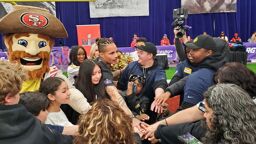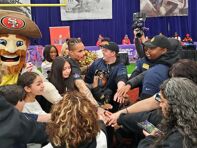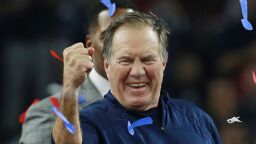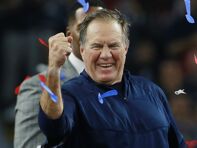Eric Reissner is the toughest player I ever had to play against in all of flag football.
The San Diego Bolts quarterback was and is a chess master. I always prided myself on being smarter than the captain on the other side of the line of scrimmage. Eric is one of only three players I ever felt could match me move-for-move on a regular basis (the other two are New York’s Wade Davis and Washington DC’s Tony Stewart).
The run that Eric and the San Diego Bolts have taken over the last six to seven years is incredible. They are the first team to win five consecutive Gay Bowls (and they tied for “first” in another rained-out tournament). They won the most consecutive games of any team in Gay Bowl history. And Eric, as a captain and quarterback, is the biggest (though of course not the “only,” as he’s quick to point out) reason for that prolonged success.
I hate calling people the “Greatest Of All Time.” Whether it’s LeBron v. Jordan, Brady v. Montana or Serena v. Margaret, it’s quite nearly impossible to claim “greatest” of any sport given how fast sports change, particularly in a relatively new sport like gay flag football. There are many great players in this sport. Wade, Tony, New York quarterback Alon Hacohen and teammate Paul Sokolson, Los Angeles’ Jim Buzinski and Demond Adams. And of course some of Eric’s teammates, like Ryan O’Shaunegsy, who have been there along for the titles. Objectively I’d throw myself into that mix. Between Eric, Wade and myself, every championship since 2006 has been won by a team with one of us on it. Yet Eric stands out as both a quarterback (who touches the ball every offensive play) and captain, someone I always felt was the biggest reason for his team’s success. Whether he’s THE GOAT or A GOAT is kind of irrelevant. He’s a legend and he’s not done with his success.
Whether he’s THE GOAT or A GOAT is kind of irrelevant. He’s a legend and he’s not done with his success.
Wade and the New York Warriors snapped the San Diego win streak last year at the Gay Bowl (you can watch the game here), and now Eric and the San Diego Bolts are back to win championship No. 6. I caught up with Eric this week to answer some questions about his football experiences, being gay in the sport, and being a/the GOAT.
Did you play football as a youth or in high school?
I started playing football in third grade. I was never a position player due to the weight limits. They put on players who were allowed to carry the ball (I was always somewhat of a chunky kid, and was always just on the wrong side of the weight limit). My third-grade year I was slotted to be the QB for our team, but missed the weight limit by three-quarters of a pound, and they didn’t let me play.
My older brother (just one year older) was an-all state offensive linemen. So, growing up “lil Reissner,” I was pretty much expected to follow in his footsteps and be a linemen. I grew “up” instead of “out” my freshman year of high school, but they still wanted me to be like my bother. Needless to say, I stopped playing football after my sophomore year of high school.
When did you start quarterbacking?
I have to admit, I became a lot more athletic in college than I was in high school. I played football, basketball and baseball in high school, but became more of an athlete in college. I felt as though I was able to “start over” at Purdue university, and no one knew who I was as far as athletics. A new found confidence came over me, and I was able to flourish in the intramural sports world.
Even though I played baseball in college, this “new me” was most apparent on the basketball court (which, coming from Indiana, is my favorite sport to play). Along the way, while acting as the athletics chairman for my fraternity (Phi Kappa Psi), I threw together a scrappy group of guys to represent our house in the flag football league on campus. We originally joined to collect “participation points” for the all-campus fraternity athletics competition. There are 40-something fraternity houses on Purdue’s campus, and you get point for participating and placing in all of the sporting leagues and events.
I always had an interest in quarterbacking, and I saw this as my opportunity. We ended up winning the entire campus fraternity league, on a “down by 5, last minute drive, the length of the field, ending with me through a 20-yard TD pass with no time left on the clock.” I can still remember it today. And that was the beginning of my QB days.
When did you first think you were LGBTQ, and when did you know?
As far back as I can remember, I have always had an attraction to men. Growing up in a athletics-dominant environment, I was taught very early on, by friends, teammates and mostly coaches, that the worst thing you could possibly be is gay.
I was always above average in Little League, and often one of the better players on my teams (whether it was basketball, baseball, or football). I used sports and my talent to suppress, and hide behind, the thoughts, curiosities and worries of being attracted to men. As I grew up, I figured it was just a phase. It was the summer between my senior year in high school and my freshman year of college that I started realizing these thoughts, curiosities and worries were starting to consume me.
My first gay experience was during my freshman year of college, and it was then that I knew this wasn’t just a phase. I battled with it for a long time, and finally came out of the closet, and moved to San Diego, at the age of 26. I wouldn’t change any of it for the world.
“One can be smart, successful, good looking and athletic… and also be gay.”
How did you find the LGBTQ football league in San Diego?
Part of the reason I chose to come out of the closet was to prove to people — my friends, my family — that one can be smart, successful, good looking and athletic… and also be gay. In Indiana, at that time, minds were not open to the whole “gay” thing. So the moment I moved to San Diego, I just started asking around and searching the Internet. I met a guy at a party one night who introduced me to a member of the flag football league, and “tryouts” happened to be the next week. I showed up, not knowing anyone. I remember the first question I was asked by someone was, “can you throw the ball?” And the rest is history….
In 2007 you led the 13 seed to the Gay Bowl Finals. Did you think you would do that going into the tournament? Walk me through that tournament a little.
Going into that tournament, the Bolts were dubbed San Diego’s “B” team. For anyone who knows me, that alone put a pretty large chip on my shoulder. In addition, the San Diego “A” team was able to pick whoever they wanted, and I was left with the “leftovers.” That added to the chip on my shoulder.
I have always been pretty confident in my abilities, and I saw something special in the group of guys I had. I can’t say that I expected to do that well, but I definitely thought it was a possibility. Keep in mind though, I had never played in a Gay Bowl before, or any gay sporting event for that matter. I went to New York City thinking we could win it all. I remember my coach for that team saying to me at one of our practices, “Eric, these guys that you will be playing are REALLY good.” My response, of course, “yeah, and I’m REALLY good too.” I guess ignorance IS bliss.
The best part of that tournament? We handily beat the San Diego “A” team in the semifinals, and that is how the Bolts were born.
At what point did you think “I could be the greatest gay flag football player ever”?
I learned a lot in NYC. After 2007 in NYC, I knew I had the chance to make my footprint in gay flag football. I knew that with the right guys, and with a little more of the reigns as far as calling the shots, I could make San Diego gay flag football a force to be reckoned with.
We recruited hard for our regular season league and I had a vision of what I wanted moving forward. I have always been taught that if you don’t win, or don’t make the team, or if you get picked last on the playground, you simply work harder than the next guy. The answer is simple, “get better!” After NYC, I knew we simply had to get better. The moment I knew that I personally was special was in Washington DC. It was in the playoffs, and we found ourselves down by two or three touchdowns. I started to panic a bit, and I was pulled aside by a random fan. He wasn’t even playing on a team. He said to me, “I have been watching you all tournament. This team goes as YOU go. You will determine the outcome of this game.”
It was that very conversation that made me realize how important I am to this squad. Not only how I play the game, but also how I lead the team. I’d like to think that I am one of the better players in [San Diego] AFFL history, but would love to be remembered as the BEST leader in AFFL history.
Many people ask me “How do I beat Eric”? And I tell them, “Get smarter.” What role does football intellect play in your success?
Listen, I am not the biggest, fastest or strongest quarterback out there…I never have been. I don’t even have the strongest arm on my team. However, I don’t think there is a QB in this tournament who calls a better game than I do. Intellect plays at least a 75% role in how I play, and how I have been able to succeed at this position in this tournament.
What victory stands out to you the most in the Gay Bowl, and what defeat stands out to you the most?
The most memorable loss was probably losing in the finals to the Los Angeles Motion in Washington, DC. We were not the better team, but my guys had played so hard and I felt like they deserved the win. We were as very strategic in that game, and we had the opportunity to win. I don’t regret going for two, at all [the last play of the game was San Diego, down by one point, going for two]. However, I regret play call. We should have gone back to the slant. I was killing Los Angeles with it all day, and Ryan was damn near “unguardable.”
Most memorable victory? Yikes… probably our first championship in Denver. It felt so amazing to finally get “over the hump.” We Had lost to LA in pool play and beat them in the semifinal. We faced a really strong NYC team in the ‘ship. We were down all game and tied it in regulation with a bomb. We won in overtime with a sack. I will never forget running out on that field and celebrating with my guys.
“I will never forget running out on that field and celebrating with my guys.”
Who are a couple of the other great players you remember playing with? Who challenged you?
I have played with some super studs, but there is definitely one who stands out: my co-captain and defensive leader, Ryan O’Shaunegsy. He is a monster on the field, leads by example, works harder than anyone I have every played any sport with… oh, and he hates to lose as much as I do. He’s a fellow NYGFL Hall of Famer, and he deserves ever bit of it. We have played in this tournament apart, but neither of us have won it without the other one.
You won five Gay Bowls in a row before losing to New York in the Finals. How do you motivate your team to look for title No. 6 in the face of that loss?
Here’s the deal. If last year’s loss doesn’t motivate them, then they don’t need to be on this team. We lost last year because I threw a pick to end the game. I have thought about that many times over the past year. We are here to take back what is rightfully ours. Going a year not being champions is the motivation!!!!
What is your No. 1 secret to on-field success?
Take what the defense gives you!!!!!!
Gay Bowl XVIII takes place this weekend in Denver.
You can follow Eric Reissner on Facebook. You can follow the NGFFL on Twitter or on Facebook. Gay Bowl XVIII is also on Facebook.







































